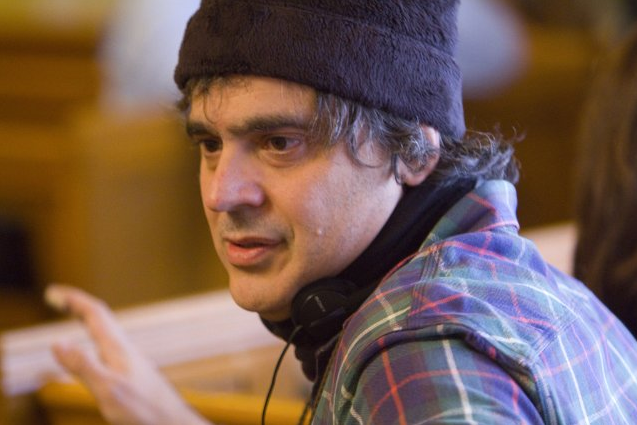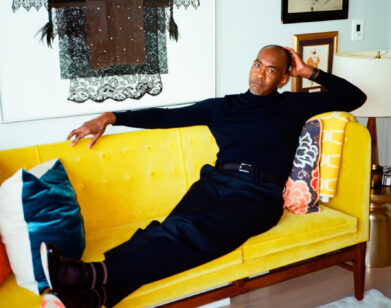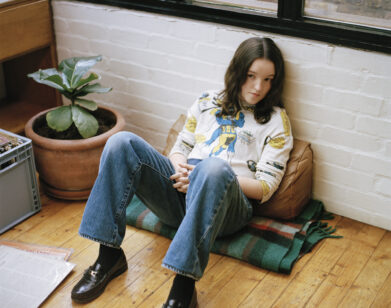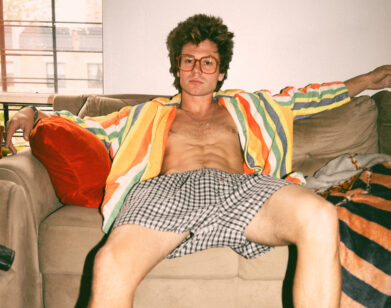Miguel Arteta’s Film Family

MIGUEL ARTETA. PHOTO COURTESY OF FOX SEARCHLIGHT
“I like Howard Hawks’ definition of a movie: three great scenes and no bad ones,” said director Miguel Arteta (The Good Girl, Chuck and Buck) at the Cedar Rapids press conference this Monday, “and it’s harder than you think.” Fortunately for Miguel, Cedar Rapids has no bad scenes and at least three great ones, probably more. His hilarious new film is about an earnest insurance salesman (Ed Helms) who travels to Cedar Rapids, Iowa for an insurance convention, where he unexpectedly teams up with a motley crew of other agents (John C. Reilly, Anne Heche, and Isiah Whitlock Jr.). Ridiculous and heartwarming shenanigans ensue. Originally from Puerto Rico, Miguel is soft spoken, sweet and honest. He gave us a look at making Cedar Rapids, which is out now in limited release.
DEENAH VOLLMER: Cedar Rapids felt like it was made by a family or close friends. Was that the case?
MIGUEL ARTETA: Something that I’m always looking for in movies is the idea of how you make a new family. If you come from a dysfunctional family, how do you make a new family? I think a lot that attracted me to Cedar Rapids is the joy of creating an unexpected friendship that may last your whole life, out of the blue. You might meet somebody that may end up being a lifelong friend. Those first few days when you connect with that person are magical and they’re fun. I feel very lucky. I think we got the chemistry. The [stars of the film] really fell in love with each other, and we got to record them falling in love with each other.
VOLLMER: You could really feel the chemistry. Did you expect that to happen?
ARTETA: Well, you throw your best hunch at how you are rolling that casting dice, hoping for that magic, but it doesn’t happen always. This was pretty great. And I think Isiah Whitlock Jr. was a big key to making these four actors really get along. There was something about him that kind of grounded the rest of them. The truth of the matter is that you just have to cast with your hunch and not with your brain [laughs] and then usually it works out better. I’m pretty delighted that this foursome ended up being wonderful.
VOLLMER: Yeah, it comes off on the screen, definitely. I read in an interview that you once said you can usually spot a director by the one that looks the most helpless.
ARTETA: That’s right.
VOLLMER: [laughs] Why do you feel helpless?
ARTETA: Well, because I don’t know how to do any job, really. Usually the director is somebody that actually doesn’t know how to do anything, but has a lot of opinions. It’s almost like you have to take the role of a benevolent dictator because you couldn’t do anything without the help of everybody else. Truly, the movie gets made by most of the other people.
VOLLMER: So in this family that you’ve created, what role are you?
ARTETA: I guess I am the therapist and godfather of the group. I was trying to make sure that they all enjoyed each other. I’m having a better time as I’m getting older. I had more fun making this movie than I have in any other movie.
VOLLMER: Why do you think that is?
ARTETA: I think you get a little less dumb as you get older. [laughs] I think that I was able to relax and let everybody do their job, be a lot more hands off and have more faith. Every movie is an act of faith, and I think I’m getting older and I’m having more faith that things will work out.
VOLLMER: Would you say in your earlier films you were more controlling as a director?
ARTETA: Yes, definitely. Directing is more about responding than it is about controlling. As I get older I see it’s a subtle difference, but it’s an enormous difference to the audience. I think when somebody is really trying to control the material and they think they’re an expert on all of the characters, the audience feels left out. Whereas when somebody is responding to an idea, to material, to a character, or a location, and trying to vibe out where their instinct is taking them, then that becomes more of an invitation for the audience to come along with them as they’re exploring what’s happening in an authentic way.
VOLLMER: Before you even began making Cedar Rapids, what kind of movie did you know you wanted to make?
ARTETA: I knew it would be like The Wizard of Oz. I had a picture of those four characters walking hand in hand on the yellow brick road. The idea was to create that sense of an adventure where unexpectedly four friends became like a real team. And I had an image of the four of them going towards the final conference where [SPOILER ALERT!] Tim is going to reveal that he took a bribe and John C. Reilly is patting him on the back and the four of them are walking and they’re going somewhere and it’s very serious. That shot is in the movie.
VOLLMER: Did you have any experience with the Midwest before this film?
ARTETA: Well, I made a movie with Michael Cera, called Youth in Revolt, and I shot it in Michigan, so I had spent six months in Michigan and I loved it. I had a great time there. And I love eating heavy food, so I think I felt right at home.
VOLLMER: What about with insurance salesmen? Anyone like the Ed Helms character?
ARTETA: No, when I first moved to L.A. in 1990, I had to go to a little Allstate office and met a guy that was going to be my insurance salesman, and I liked him. I was surprised. I was like, “This is a nice guy.” And since then I’ve talked to a lot of people who know agents and everybody says that agents tend to be more like Timothy than the sort of conniving idea we have. I think that it’s that the conglomerates of insurances are the evil source, but the actual agents tend to be more caring people in general.
VOLLMER: Well good, you’re doing them a service in this film.
ARTETA: I hope so.
VOLLMER: You’re very good in your films with balancing the funny with the sad. Does this come from a very personal place? Is it something you strive for or is it an accident?
ARTETA: I think that is my point of view on the world. I think things are funny and sad and heartbreaking and hilarious and ridiculous and they’re all different sides of the same coin. I think we’re all driven by the damage. Every parent has a God-given right to fuck up their kids and every parent does in some way or another. I think what’s special about us comes from that damage and, I love that. So that’s what I’m tuning into with characters. I love characters. Damaged goods that lead with their damage that somehow comically or ironically end up getting better because they have the courage to do that, but maybe it’s wishful thinking on my part.
VOLLMER: I heard a rumor that Miranda July’s new film is about you—do you have a comment?
ARTETA: Well, do you think I look a little bit like the guy [Hamish Linklater]?
VOLLMER: Yeah!
ARTETA: Yeah, well, you know, she and I dated when she was making Me and You and Everyone We Know, and when she was making this she said, “There’s elements of our break-up in this, but it’s not really about our break-up.” I definitely was surprised that my shaggy haircut could be replicated so well. [laughs]
VOLLMER: Did you have any moments when you were watching her film like, “Oh, this feels like a personal moment.”
ARTETA: Definitely. But I think in this movie she was trying to assert herself, her true artistic self, in a very uncompromising way and still make it work. I think she did some beautiful work, and I recognize elements of our relationship, and all of her work is extremely personal, so it’s impossible not to if you’ve known her. Yeah, that was long ago. That was five years ago.
Yeah, it’s funny how much I look like that guy. I used to be fifty pounds thinner so I feel bad for that guy if he had to lose weight to try and look like I used to look. [laughs]
VOLLMER: I was struck by when you mentioned your dysfunctional family earlier. Do you feel like making films has been kind of like a therapy for you?
ARTETA: Yeah, I definitely use movies as therapy. Star Maps was very much about feeling like I was abused by my family and the dreams of trying to get away from them. I was a very obsessive person. Chuck & Buck was a movie that helped me get over being obsessive. And The Good Girl was a movie about depression and I learned something really significant in that movie which is, in order to not be depressed you have to murder your fantasy life. Which is not the first obvious way you think to get away from depression. And Youth in Revolt to me was very much a satire celebrating what it’s like to fall in love, which is something I was really yearning for, and it happened right after it. Cedar Rapids is about realizing that I have good values, I just need to wise up a little bit and feel confident about my priorities. Hopefully that will result in having a wonderful group of friends around me.
CEDAR RAPIDS IS OUT NOW IN LIMITED RELEASE.






